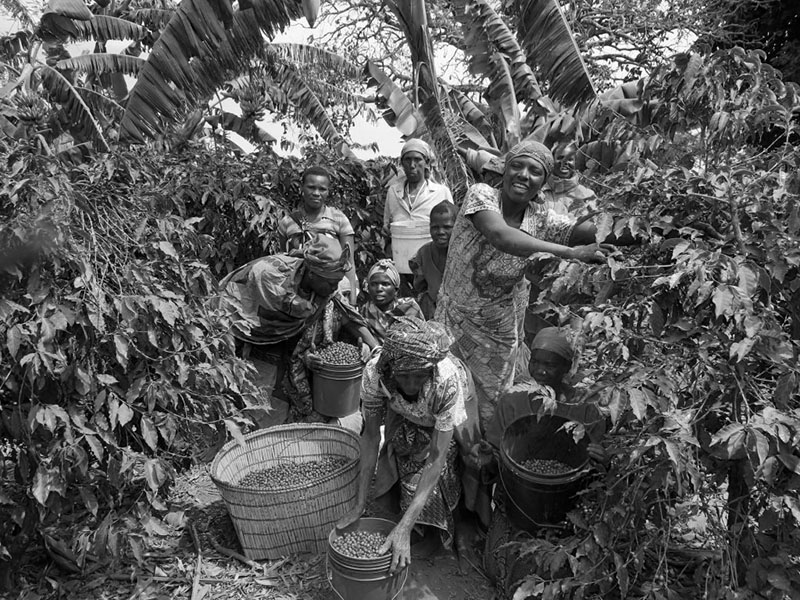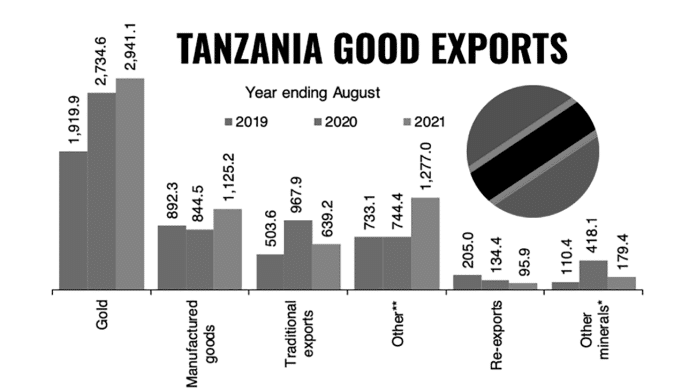A Snapshot of Tanzania Exports by Major Sectors
What are the Main Exports of Tanzania?
The main exports of Tanzania are minerals, manufactured goods, tourism, horticultural products, fish and its products, and crops.
Tanzania Tourism Exports
The tourism sector is Tanzania’s biggest foreign currency earner. In 2019, visitor exports generated $2.5 billion. Compared to only $2 billion generated in 2015, this figure represents a 25 percent increase.
Tanzania Mineral Exports
In 2019, minerals exported out of Tanzania rose to almost $2.3 billion from $1.4 billion recorded in 2015. This figure represents 24 percent of the country’s total export. In 2019, Gold exports accounted for $2.2 billion of Tanzania’s total export. The figure represents over 90 percent of Tanzania’s total mineral export. The country’s gold exports rose by 83 percent over the last five years, having made $1.2 billion in 2015. India, Switzerland, and South Africa are the main importers of Tanzania’s gold, situation that makes Tanzania gold exports be among the Tanzania top exports overall. Tanzania exports other minerals, including diamonds, rubies, tanzanite, copper, sapphires, emerald, silver, and many precious stones.
Tanzania gold export tax has been one of the key revenue generator for the government and country as a whole.
Tanzania Coal Exports

Tanzania does not have significant coal reserves and does not engage in large-scale coal mining or coal exports. Tanzania’s primary energy sources include natural gas, hydroelectric power, and biomass. These energy sources have played a more prominent role in the country’s energy production and exports.
However, please note that situations can change over time. It’s possible that there have been developments in Tanzania’s coal industry.
Manufactured Goods
Tanzania made $985 million from manufactured goods exports in 2019. This accounted for 10 percent of Tanzania main exports and represented a 30 percent drop from the $1.4 billion made in 2015. Tanzania exports manufactured goods like cotton yarn, textile apparel, manufactured tobacco and coffee, sisal products (twine and yarn), cement, wheat flour, and plastic items.
Tanzania Wood Export
Tanzania is known for its rich natural resources, including forests with a diverse range of tree species. The country has been involved in wood exports for many years, providing valuable timber products to international markets. However, please note that our knowledge may not be able to cover the whole scope of the sector, and there may have been recent developments or changes in the Tanzanian wood export industry since then.
Tanzania’s wood export industry primarily focuses on hardwood timber, which is in high demand for various applications such as furniture, construction, flooring, and decorative purposes. Some of the prominent hardwood species found in Tanzania include teak, mahogany, ebony, rosewood, and various types of oak.
The Tanzanian government regulates the wood export industry through the Ministry of Natural Resources and Tourism, the Tanzania Forest Services (TFS), and other relevant authorities. These regulatory bodies enforce laws and regulations to ensure sustainable harvesting practices and the protection of the country’s forests.
To export wood from Tanzania, individuals or companies involved in the trade need to obtain the necessary permits and licenses. This process involves obtaining a Timber Utilization Permit (TUP) from the TFS, which grants permission to harvest and export timber. The TUP specifies the quantity, species, and origin of the timber to be exported.
Additionally, exporters must comply with international trade regulations and documentation requirements, such as obtaining a Certificate of Origin and ensuring adherence to the Convention on International Trade in Endangered Species of Wild Fauna and Flora (CITES) regulations for protected tree species.
It’s important to note that the international trade in timber is subject to regulations and restrictions imposed by different countries to prevent illegal logging and promote sustainable forestry practices. Importing countries often have their own specific requirements and regulations that Tanzanian wood exporters must meet.
For the most up-to-date and accurate information regarding Tanzanian wood exports, it is advisable to consult with relevant government authorities, such as the Ministry of Natural Resources and Tourism, the Tanzania Forest Services, or trade associations specializing in the timber industry.
Tanzania Agricultural Exports
In 2019, crop exports accounted for $830 million (9 percent) of Tanzania’s total exports. The figure represents a five percent increase from the $739 million made in 2015. Cashew nuts and raw tobacco are the most exported cash crops in Tanzania. Nearly 80 percent of Tanzania’s cashews are exported to India, while Poland, Russia, and Germany are the top destinations for Tanzania’s tobacco.
Related Insight on Some of the Tanzania Major Exports in Agriculture
Coffee Exporters in Tanzania

There are several coffee exporters in Tanzania. Here are some prominent ones:
1. Tanzania Coffee Board (TCB): TCB is a government organization responsible for regulating and promoting the coffee industry in Tanzania. They also facilitate coffee exports through various channels.
2. Tanzania Coffee Research Institute (TaCRI): TaCRI plays a crucial role in coffee research and development in Tanzania. While they primarily focus on research, they also collaborate with exporters to promote high-quality Tanzanian coffee in international markets.
3. Tembo Coffee Company Limited: Tembo Coffee is a leading coffee exporter in Tanzania. They work closely with small-scale coffee farmers to source and export high-quality Arabica coffee beans. They have a strong focus on sustainability and fair trade practices.
4. Kyela Coffee Exporters: Kyela Coffee Exporters is a well-established company that specializes in exporting Tanzanian coffee. They work with both small-scale and large-scale coffee farmers, ensuring quality control and international market access.
5. Taylor Winch Tanzania: Taylor Winch is a renowned coffee exporter with a long history in Tanzania. They have partnerships with various coffee estates and cooperatives to export specialty-grade Arabica coffee beans.
6. Volcafe Tanzania Limited: Volcafe is a subsidiary of the ED&F Man Group, a global commodities trader. They are one of the largest coffee exporters in Tanzania, involved in the sourcing, processing, and export of coffee from different regions of the country.
These are just a few examples of coffee exporters in Tanzania. The country has a vibrant coffee industry, and there are numerous other exporters, cooperatives, and trading companies that contribute to Tanzania’s coffee exports.
Tanzania Cashew Nut Exporters
There are several cashew nut exporters in Tanzania. Here are a few notable ones:
1. Export Trading Company Limited (ETG): ETG is a leading agricultural commodities trading company based in Tanzania. They are involved in the export of various agricultural products, including cashew nuts. They have a strong presence in Tanzania’s cashew nut export market and work with local farmers to source high-quality cashew nuts for export.
2. Kilimo Timilifu Tanzania Limited: Kilimo Timilifu is a Tanzanian company that specializes in the production and export of organic cashew nuts. They work closely with small-scale farmers and promote sustainable farming practices to ensure the quality and traceability of their products.
3. East Africa Cashew Company (EACC): EACC is among the major cashew exporters in Tanzania. They have established partnerships with cashew nut farmers across the country and have a well-established supply chain network for exporting cashew nuts to various international markets.
4. Tanzania Cashewnuts Board (TCB): TCB is a government agency responsible for overseeing the cashew nut industry in Tanzania (Tanzania cashew exporters and regulations specifically). While they primarily regulate and promote the sector, they also facilitate the export of cashew nuts by providing support and guidance to exporters.
These are just a few examples of the raw cashew nuts exporters in Tanzania, and there may be other cashew nut exporters operating in the country. If you’re interested in engaging with a specific exporter, it is recommended to research their reputation, certifications, and export capabilities before entering into any business agreements.
Tanzania Avocado Export
Tanzania is one of the countries that produces avocados for export. Avocado farming has been growing in Tanzania, and the country has the potential to become a significant player in the global avocado market.
Tanzania’s avocado exports primarily target international markets such as Europe, the Middle East, and Asia. The European Union, especially the United Kingdom, is a major market for Tanzanian avocados. Additionally, countries like the United Arab Emirates and Saudi Arabia in the Middle East are important destinations for Tanzanian avocado exports.
Avocado farming in Tanzania is mainly carried out in the southern regions of the country, including Mbeya, Njombe, Iringa, and Morogoro. Small-scale farmers and larger commercial farms contribute to avocado production in the country.
Tanzanian avocados are known for their quality, flavor, and large size. However, it’s important to note that specific details regarding recent developments in Tanzania’s avocado export industry may have changed since our last observation. For the most up-to-date and accurate information, we recommend consulting reliable sources such as government reports, agricultural organizations, or trade publications.
Tanzania Fish Export
Tanzania is a country located in East Africa with a vast coastline along the Indian Ocean, making it well-positioned for fishery activities and fish exports. The country has a diverse range of fish species found in its coastal waters, lakes, and rivers. Some popular fish species in Tanzania include Nile perch, tilapia, catfish, tuna, and sardines.
Tanzania engages in fish exports to generate revenue and promote economic growth. The main markets for Tanzanian fish exports include Europe, particularly the European Union countries, as well as neighboring countries in East Africa. The export of fish products contributes to Tanzania’s foreign exchange earnings and supports the livelihoods of numerous individuals involved in the fishing and fish processing industries.
The Tanzanian government has implemented measures to regulate and control fish exports to ensure sustainability and quality. These measures include licensing and inspection processes to ensure compliance with international standards and regulations. Fish processing facilities, such as fish filleting, freezing, and canning plants, play a crucial role in adding value to the exported fish products.
It’s important to note that specific information regarding the current state of Tanzania’s fish export industry, such as the volume of exports or recent developments, may vary and could be more up-to-date than our current insight. It would be beneficial to refer to the latest reports, trade data, or reach out to relevant government agencies or trade organizations for the most accurate and recent information on Tanzania’s fish export sector.
Frequently Asked Questions and Tanzania Import Export Statistics
What are the Major Imports and Exports of Tanzania?
As of per our knowledge about import and export in Tanzania, the country is an East African nation with a diverse economy. Tanzania major imports and exports include the following:
Major Imports of Tanzania:
1. Machinery and equipment
2. Industrial raw materials
3. Chemicals and fertilizers
4. Petroleum products
5. Motor vehicles and spare parts
6. Pharmaceuticals
7. Electrical equipment and electronics
8. Iron and steel
9. Textiles and clothing
10. Food and agricultural products
What does Tanzania export?
Major Exports of Tanzania:
1. Agricultural products (coffee, tea, tobacco, cashews, cotton, sisal, and horticultural products)
2. Minerals (gold, diamonds, tanzanite, gemstones, and various ores)
3. Manufactured goods (textiles, garments, processed food products)
4. Fish and seafood products
5. Tobacco
6. Timber and wood products
7. Livestock and animal products (meat, hides, and skins)
8. Cement
9. Natural gas and related products
10. Tourism services
Please note that the specific composition of Tanzania imports and exports may have changed since our last observation. For the most up-to-date and detailed information, we recommend referring to official government sources, such as the Tanzania Revenue Authority or the Ministry of Industry and Trade.
Recent Years Tanzania Export Data
How About Exporting to Tanzania?
Exporting to Tanzania involves several steps and considerations. Here’s a general overview of the process:
1. Market Research: Conduct thorough research to understand the market demand, competition, and regulatory requirements in Tanzania. Identify potential customers, local distributors, or partners who can assist with your export activities.
2. Product Adaptation: Assess if your product needs any modifications or adaptations to meet Tanzanian market standards, regulations, or cultural preferences. Consider factors such as language, packaging, labeling, and product certifications.
3. Export Documentation: Prepare the necessary export documentation, which may include commercial invoices, packing lists, certificates of origin, insurance certificates, and any specific certificates required for your product category. Ensure that all documents comply with Tanzanian customs and import regulations.
4. Compliance and Regulations: Familiarize yourself with Tanzanian customs regulations, import restrictions, and applicable trade policies. Ensure your product complies with all relevant standards and regulations imposed by Tanzanian authorities. Depending on the nature of your product, additional permits or licenses may be required.
5. Shipping and Logistics: Arrange for transportation of your goods to Tanzania. Select a reliable freight forwarder or shipping agent with experience in handling exports to Tanzania. They can assist with freight booking, documentation, customs clearance, and delivery to the final destination.
6. Tariffs and Taxes: Determine the applicable tariffs, taxes, and duties for your product. Verify if any preferential trade agreements or duty exemptions apply, such as the East African Community (EAC) Customs Union or other trade agreements between your country and Tanzania. Consult with a customs expert or trade specialist to ensure accurate calculation of costs.
7. Payment Methods: Decide on the most suitable payment method for your export transaction. Options may include letters of credit, advance payment, open account, or other payment terms. Ensure secure payment channels and consider using internationally recognized trade finance mechanisms.
8. Distributor or Agent Selection: If you plan to work with a local distributor or agent, carefully evaluate potential partners based on their experience, reputation, market knowledge, and distribution network. Visit trade shows, participate in business matchmaking events, or engage with local trade associations to find reliable partners.
9. Customs Clearance and Import Procedures: Ensure that your shipping documents and customs declarations are accurate and complete. Provide any necessary information to your local agent or customs broker to facilitate smooth customs clearance upon arrival in Tanzania. Familiarize yourself with import procedures, including any required inspections or permits.
10. Marketing and Sales: Develop a marketing strategy tailored to the Tanzanian market. Consider cultural nuances, local preferences, and effective promotional channels. Leverage online platforms, local media, industry associations, and business networks to raise awareness about your product and reach potential customers.
11. After-sales Support: Establish a plan for providing after-sales support, warranty services, spare parts, or technical assistance to your Tanzanian customers. Building a reputation for reliable support can help foster long-term customer relationships and enhance your market presence.
It’s important to note that export procedures and requirements may vary depending on the nature of your product, Tanzanian regulations, and any trade agreements in place. Consulting with local trade experts, export promotion agencies, or the Tanzanian embassy or consulate in your country can provide more specific guidance tailored to your circumstances.
What Does Kenya Export to Tanzania
Kenya and Tanzania are neighboring countries in East Africa and have a history of significant trade relations. Kenya exports a variety of goods to Tanzania. Some of the main exports from Kenya to Tanzania include:
1. Petroleum Products: Kenya exports petroleum products such as gasoline, diesel, and kerosene to Tanzania.
2. Cement: Kenya is a major exporter of cement to Tanzania. Kenyan cement companies have a significant presence in the Tanzanian market.
3. Pharmaceuticals: Kenya exports pharmaceutical products, including medicines and medical supplies, to Tanzania.
4. Tea: Kenya is one of the largest exporters of tea in the world. Tea is also exported from Kenya to Tanzania.
5. Wheat Flour: Kenya exports wheat flour to Tanzania, which is used in various food preparations.
6. Fresh Fruits and Vegetables: Kenya exports a wide range of fresh fruits and vegetables to Tanzania, including mangoes, avocados, pineapples, bananas, and vegetables like tomatoes, onions, and carrots.
7. Animal Products: Kenya exports animal products such as meat and dairy products to Tanzania.
8. Iron and Steel Products: Kenya exports iron and steel products, including bars, rods, and sheets, to Tanzania.
9. Plastics and Plastic Products: Kenya exports plastic products, such as packaging materials and containers, to Tanzania.
10. Textiles and Apparel: Kenya exports textiles, clothing, and apparel items to Tanzania.
It’s worth noting that trade between Kenya and Tanzania can vary over time, and this list may not be exhaustive. Additionally, specific trade volumes and commodities can be influenced by factors such as economic conditions, trade agreements, and market demand.
Tanzania Import Export Statistics
Tanzania Exports by Country
List of Exporters in Tanzania
The following is some of the main export companies in Tanzania:
- Export processing zone authority Tanzania
- Export trading co ltd Tanzania (Export trading company Tanzania)
- Export trading group Tanzania
- Sesame seeds exporters in Tanzania (Tanzania sesame exporters)
Import and Export Procedures in Tanzania
For more investment in Tanzania articles click here!


































